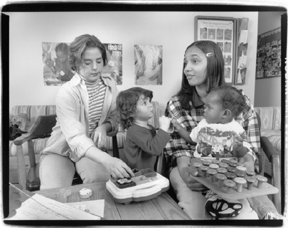 The University of Chicago Magazine June 1996
The University of Chicago Magazine June 1996
 Surprise: The U of C's Joe Hotz says many teenage moms-like these women receiving job counseling at Chicago-area Aunt Martha's Youth Services-later earn more than their peers.
Surprise: The U of C's Joe Hotz says many teenage moms-like these women receiving job counseling at Chicago-area Aunt Martha's Youth Services-later earn more than their peers.Everybody loves a teenage mother. Firebrand conservative or bleeding-heart liberal, academic or politician, if you've got a pen and a cause to propound, she's your gal. The Bell Curve coauthor Charles Murray frets about the onslaught of the swollen-bellied underclass; departing U of C sociologist William Julius Wilson brought the now-pejorative "female-headed household" into the lexicon. Last year a House budget bill even recommended cutting off AFDC money to any mother under 18; the bill's opponents objected to punishing the innocent infants for the "sins of teen pregnancy." A 1995 Newsweek cover story on the topic summed up what everybody knows: "The Name of the Game Is Shame."
A recent study by the U of C's V. Joseph Hotz; his former graduate student Seth Sanders, AB'84, AM'85, PhD'93; and Susan Williams McElroy of Carnegie Mellon, may force the experts to do some rethinking. As Hotz, a professor in the Irving B. Harris Graduate School of Public Policy Studies, says, "We've become too glib about teen pregnancy." In public debate on the issue, the relationship between early childbearing and low income is taken as axiomatic: Teen mothers stay poor because they're "kids having kids"; but for a couple of condoms, self-esteem classes, or lectures on abstinence from a stern patriarch, they'd be sure to be living better lives. No one disputes that teenage mothers are, on average, poorer and less educated than the general population. But "the crucial question is the question of causality," as Hotz says. Do women remain poor because they have children as teenagers? Or do they have kids as teenagers because they're poor?
The goal of most social programs designed to fight teen pregnancy is, tautologically, to convince mothers to delay childbearing. Will a delay actually improve their educational achievement and career chances? Hotz, whose writings have linked labor economics with family and child-care issues, wanted to test this assumption by isolating the variable of pregnancy, showing what happens to women similar in all respects to teenage moms-except that they do not give birth as teenagers. Yet, in the jargon of social science, one can't assign or deny women pregnancies via a "randomizing mechanism."
So Hotz used the closest thing nature offers to a randomizing mechanism--a miscarriage. Analyzing data from the National Opinion Research Center--conducted National Longitudinal Study of Youth, which since 1979 has tracked individuals from adolescence into adulthood, he found that many pregnant teenagers neither give birth nor abort their pregnancies. They miscarry, and have their first child between ages 20 and 25. While the means is different, the outcome is what one would expect from an imaginary, "perfect" program to stop teen pregnancy.
Using this control group, Hotz's team arrived at findings that blow old assumptions out of the water. Teenage mothers actually achieve higher levels of economic success: They earn more money and work more hours than if they had waited to bear children. "For some of these women, it's best to have kids early," observes Hotz. "If you delay their births rather than letting them do what they would have done on their own, they'll actually be worse off."
AFDC's harshest critics depict teen mothers as indolent, high-living, welfare queens, while in polite public-policy speak, they're sometimes portrayed as "mentally disadvantaged," unable to hold even menial jobs. Neither image squares with what Hotz discovered. Teen mothers are, predictably, less likely to work long hours during their teenage years, when their children are young. However, once they hit their 20s, such mothers work 100 to 200 hours a year more than they would have had they delayed childbearing, totaling between 600 and 1,200 hours per year on average.
Earnings were similarly affected. Early childbearing initially depresses a woman's earnings by about $2,500 a year. By the time she reaches her 20s, though, a teen mother earns $5,000 more (in constant dollars) than her counterpart in Hotz's control group-or an average of $11,000 a year at age 25, and $19,000 at age 30. Hotz offers a possible explanation: Seniority and experience matter more than credentials in the service-sector jobs that low-income women frequently hold-as secretaries, nurse's aides, or telephone receptionists. Interrupting such work to care for young children is more harmful to a mother's salary than taking time off from high school.
Of course, teenage motherhood isn't a bed of roses. While they often obtain a G.E.D. in their late teens or 20s, teenage mothers are less likely to finish high school than those who wait to have kids. Extremely young mothers, age 15 and under, never outpaced the control group's later earnings. But Hotz's work does question the notion that teen births can be chalked up to the supposed ignorance, irresponsibility, and low moral standards of poor girls; motherhood can instead be a rational response to a difficult situation. "Teenage motherhood may be a real social problem," says Hotz. "But we have to be clear about what it is. When a behavior pattern is so systematic, so pervasive, you have to say that it's wrong to keep treating it as a series of accidents or unintended behavior. There is some sense in what these women are doing."
The gulf between his study's findings and the popular wisdom took Hotz by surprise-above all, teen motherhood's effect on income: "We were expecting that earnings disadvantages would be diminished, but not that they would be reversed." The point, says Hotz, is that society doesn't work like a controlled experiment, where scientists can isolate each variable. "You'd think that if we solved this problem of teenage childbearing, all our social ills would melt away," he says, "but it's seldom that the world is such that a silver-bullet panacea will have such an effect. The reason teen pregnancy has proved such a difficult problem to solve is that it's only a symptom, not the real problem."--Kim Phillips '97